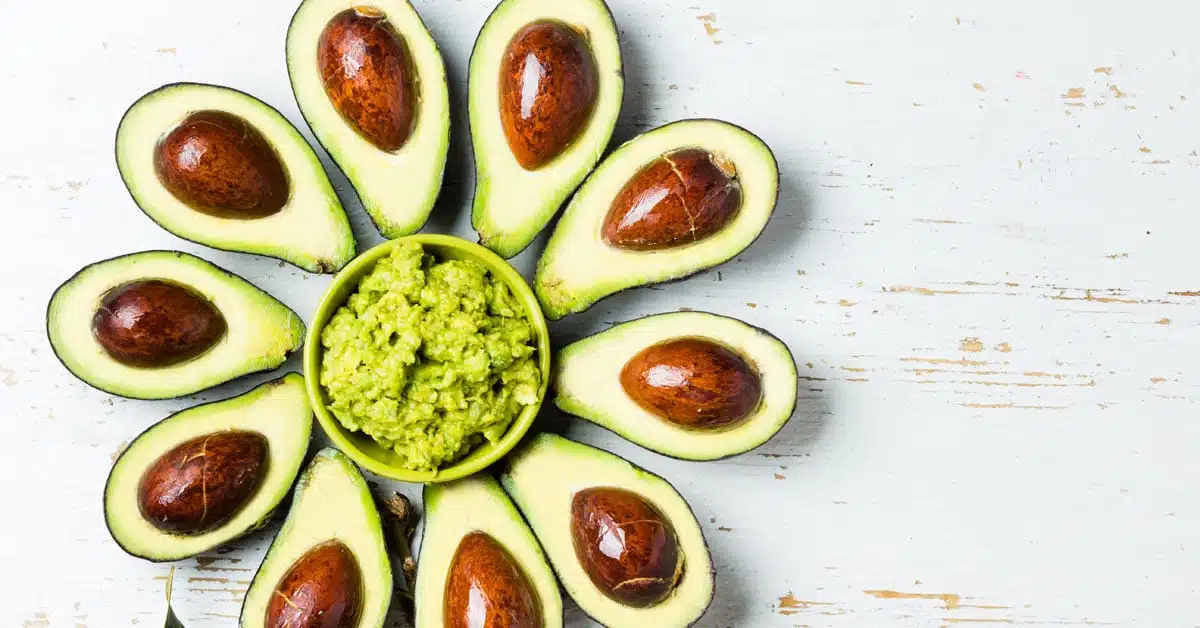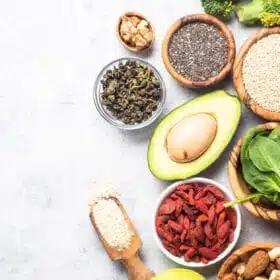There is food and there is food. Avocados belong in any case in the second category, because around no food was made in recent years such a hype, as around the avocado. And there are a number of reasons for this. Probably the best reason, besides the unique taste, is the variety of uses. Whether as a topping on a chicken sandwich, in a salad, grilled or as an ingredient in a dessert - the avocado cuts a very fine figure everywhere. Avocado is not only tasty and versatile, but also belongs on your menu for the following 10 reasons.
1. avocados are micronutrient bombs
Strictly speaking, the avocado is something like a natural multivitamin that contains large quantities of various vitamins, minerals and trace elements and can thus cover a significant part of your daily requirements. For example, 100 grams of the fruit provide you with 27 percent of your daily requirement of folic acids and a whopping 30 percent of your daily requirement of vitamin K. Other micronutrients contained in high doses are potassium, copper, vitamin C, vitamin E and the B vitamins.
2. the fruits contain many healthy fats
Did you know that avocado gets almost 80 percent of its calories from fat? Sounds strange, but it's true. What's even more amazing is that avocado, which is one of the fattiest fruits in the plant world, is also pretty darn healthy, because a majority of the fats are unsaturated fatty acids, which help strengthen the cardiovascular system. And that's not all, because scientific data suggest that the enzyme lipase, which is also contained in avocados, can even support fat burning.
3. better nutrient absorption thanks to avocados
The high fat content of avocado has another decisive advantage for your organism. While water-soluble vitamins can be easily absorbed by our body, we need fat for the absorption of fat-soluble vitamins like vitamins A, E and K. And it just so happens that an avocado not only provides you with significant doses of these vitamins, but also provides healthy fats that help your body absorb the vitamins. All the more reason to add a few slices of avocado to a crunchy salad.
4. avocados are a valuable source of potassium
Potassium is one of the most important micronutrients for our body, because without the constant interaction of potassium and sodium, neither heartbeat and nerve conduction nor muscle contraction would function. Moreover, too little potassium intake is one of the factors that promote high blood pressure. Scientific studies even show that sufficient potassium intake in hypertensive patients leads to a drastic reduction in the risk of stroke.
5. regular consumption improves blood lipid levels
The high proportion of unsaturated fatty acids has a major influence on blood lipid levels. Both excessively high LDL cholesterol levels and triglyceride levels are common causes of cardiovascular disease and accordingly classify as risk factors for stroke and heart attack. However, regular consumption of avocado can help lower total cholesterol levels and improve the ratio of LDL to HDL cholesterol. Scientific studies also show that triglyceride levels in the blood of test subjects can drop by up to 20 percent as a result of avocado consumption.
6. avocados are good for the eyes
Those who do not like carrots now have at least one good reason to switch to avocado. The fruit contains large amounts of the antioxidant lutein, which plays a key role in eye health. A sufficient supply of lutein ensures, for example, that the risk of suffering from eye diseases such as cataracts in old age is significantly reduced.
7. the dietary fiber it contains promotes digestion
Dietary fiber is enormously important for digestion, because it contributes to the health of the intestinal flora, loosens the stool and ensures that the intestines can function optimally. However, the average adult in this country consumes only 24 grams of dietary fiber per day. This is clearly too little, especially since nutritionists recommend a minimum intake of 30 grams per day. How good that 100 grams of avocado already provide you with 7 grams of high-quality fiber.
8. avocados could support cancer prophylaxis
Even though one should always be very careful with such formulations, however, there are already numerous studies in science that suggest a connection between avocado consumption and a decreasing risk of cancer. Cell tests have already revealed that avocado extract can inhibit the cell growth of prostate cancer cells.
In addition, another study shows that the administration of avocado extract can also significantly reduce chemotherapy side effects on lymphocytes. In general, the medical consensus also states that a high-fiber diet with plenty of fruits and vegetables can reduce the risk of colorectal cancer, breast cancer and prostate cancer, among others.
9. avocados are worth several times for pregnant women
Pregnant women benefit particularly from the nutrient richness of the avocado, especially since the micronutrient requirement increases significantly due to the growing child. Accordingly, the intake of nutrients must also be increased, because nature gives the growing child the "nutrient right of way", so to speak, which means nothing other than that the child is supplied first, regardless of whether there is enough left for the mother or not.
It is particularly important to cover folic acid requirements during pregnancy, as a sufficient supply reduces the risk of developmental disorders in the child and miscarriages. How fortunate that 100 grams of avocado already cover 30 percent of the daily requirement of folic acid.
10. avocados help to lose weight
If you weren't convinced about avocado before, you probably are now. Due to its high content of fiber and unsaturated fatty acids, the fruit has some positive properties that help you lose weight. The interplay of fiber and the high proportion of healthy fats leads to a long-lasting feeling of satiety and a much more stable blood sugar level, which in turn massively reduces the risk of cravings.
In a study published in the Nutrition Journal in 2013, two groups were compared in terms of hunger pangs and satiety. The participants in the avocado group felt an average of 30 percent less desire to eat a meal within the next five hours after consumption.






